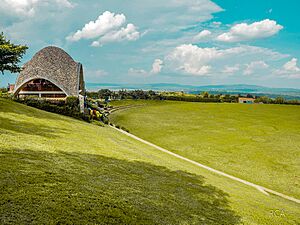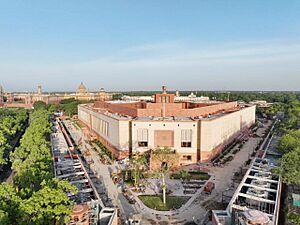Commonwealth of Nations facts for kids
Quick facts for kids
Commonwealth of Nations
|
|||||||
|---|---|---|---|---|---|---|---|
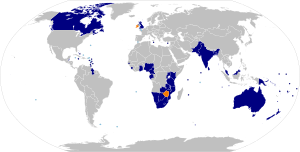
|
|||||||
| Headquarters | Marlborough House, London, United Kingdom | ||||||
| Working language | English | ||||||
| Type | Voluntary association | ||||||
| Member states |
56 states
|
||||||
| Leaders | |||||||
|
• Head
|
Charles III | ||||||
| Shirley Ayorkor Botchwey | |||||||
| Fiamē Naomi Mataʻafa | |||||||
| Establishment | |||||||
| 19 November 1926 | |||||||
| 11 December 1931 | |||||||
|
• London Declaration
|
28 April 1949 | ||||||
| Area | |||||||
|
• Total
|
29,958,050 km2 (11,566,870 sq mi) | ||||||
| Population | |||||||
|
• 2016 estimate
|
2,418,964,000 | ||||||
|
• Density
|
75/km2 (194.2/sq mi) | ||||||
|
|||||||
The Commonwealth of Nations is a friendly group of 56 countries from all over the world. Most of these countries used to be part of the British Empire. They are connected by their shared history, the English language, and similar cultures.
The main goals of the Commonwealth are to promote democracy, human rights, and the rule of law. They also work together on things like economic development and helping each other. The Commonwealth has two main parts: the Commonwealth Secretariat, which helps governments work together, and the Commonwealth Foundation, which connects people and groups.
The Commonwealth started in the early 1900s as countries that were part of the British Empire began to govern themselves. It was officially formed in 1931. In 1949, a big change happened: countries could remain members even if they became republics (meaning they didn't have the British monarch as their head of state).
Today, Charles III is the Head of the Commonwealth. This is a symbolic role. Many member countries are republics, while others have their own monarchs. Commonwealth countries often send "high commissioners" instead of ambassadors to each other, showing their special connection.
Contents
How the Commonwealth Started
Early Ideas for Connection
The idea of the Commonwealth began a long time ago. In 1884, someone called Lord Rosebery described the changing British Empire as a "Commonwealth of Nations." This was because some colonies were becoming more independent.
Leaders from Britain and its colonies started having meetings in 1887. These meetings eventually led to the Imperial Conferences in 1911.
Becoming Official
In 1917, Jan Smuts used the term "British Commonwealth of Nations." This idea was first officially recognized in a treaty in 1921.
A big step happened in 1926 with the Balfour Declaration. Britain and its self-governing territories agreed they were "equal in status." They were united by their connection to the Crown but were free to manage their own affairs. The term 'Commonwealth' was officially adopted.
These agreements became law with the Statute of Westminster 1931. This law made it clear that these countries were independent.
The Commonwealth During World War II
Commonwealth countries played a big part in the Second World War. Soldiers and pilots from across the Commonwealth fought together. For example, the British Commonwealth Air Training Plan trained pilots from many member countries.
Countries Becoming Independent
After World War II, many parts of the British Empire became independent countries. Most of them chose to join the Commonwealth. In April 1949, the word "British" was removed from the Commonwealth's name. This showed that it was no longer just about Britain.
Some countries, like Myanmar (now Myanmar) and Aden (now part of Yemen), were British colonies but did not join the Commonwealth when they became independent.
Republics in the Commonwealth
In 1949, Ireland left the Commonwealth when it became a republic. However, India wanted to become a republic but still stay in the Commonwealth. At a meeting in London in April 1949, leaders agreed that India could remain. This was a big moment. It meant countries could be republics and still be part of the Commonwealth, as long as they recognized the British monarch as the "Head of the Commonwealth."
Many other countries have since become republics and remained members. This shows how the Commonwealth has changed and grown.
New Members Join
The Commonwealth has welcomed new members even if they were not part of the British Empire.
- In 1995, Mozambique, a former Portuguese colony, joined.
- In 2009, Rwanda, which was under Belgian and German rule, became a member.
- In 2022, Togo and Gabon, both former French territories, also joined. Togo's foreign minister hoped joining would help citizens learn English and access more education. Gabon was temporarily suspended in September 2023 after a military coup but was fully reinstated in July 2025 after a presidential election.
How the Commonwealth Works
The Head of the Commonwealth
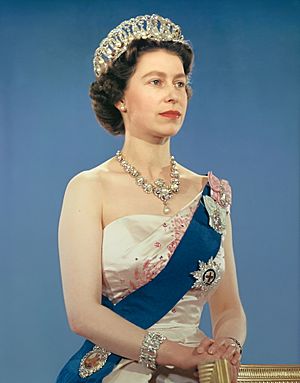
Charles III is the Head of the Commonwealth. This role is symbolic. It means he represents the free and equal association of all member countries. Even though he became Head after his mother, Queen Elizabeth II, passed away, the position is not automatically passed down through the royal family.
Meetings of Leaders
The main meeting for the Commonwealth is the Commonwealth Heads of Government Meeting (CHOGM). This meeting happens every two years. Leaders like prime ministers and presidents come together to talk about important issues. The leader of the country hosting the CHOGM becomes the "chair-in-office" until the next meeting.
The Commonwealth Secretariat
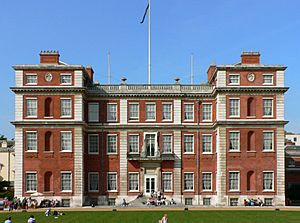
The Commonwealth Secretariat is like the main office of the Commonwealth. It helps member governments work together. It organizes meetings, helps develop policies, and gives advice. It also helps countries with their social and economic development.
The Secretariat is led by the Commonwealth secretary-general. This person is chosen by the leaders for up to two four-year terms. The current Secretary-General is Shirley Ayorkor Botchwey from Ghana.
Commonwealth Citizens and High Commissions
Some Commonwealth countries give special rights to Commonwealth citizens. For example, in the United Kingdom, Commonwealth citizens who live there can vote.
Instead of having "embassies" in each other's countries, Commonwealth nations have "high commissions." This shows their close and friendly relationship. If a Commonwealth citizen is in a country where their own country doesn't have an embassy, another Commonwealth country's embassy might be able to help them.
Who Can Join the Commonwealth?
Joining Rules
Over time, rules for joining the Commonwealth have changed.
- Members must agree with the Commonwealth's values, like democracy, human rights, and equality.
- They must be fully independent countries.
- They need to recognize the Head of the Commonwealth.
- They should use English for Commonwealth communication.
- They must respect what their people want regarding Commonwealth membership.
Usually, new members need to have a direct historical link to an existing member. However, as mentioned, countries like Mozambique, Rwanda, Togo, and Gabon have joined without this direct link.
Current Members
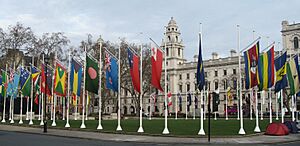
The Commonwealth has 56 member countries. They are located on every continent. Many of them are small island nations. In 2023, the Commonwealth had about 2.5 billion people. India is the largest member by population, with 1.4 billion people. Tuvalu is the smallest, with about 12,000 people.
Countries That Want to Join
Some countries have shown interest in joining the Commonwealth. For example, politicians from South Sudan have expressed interest.
Being Suspended or Leaving
Countries can be suspended from the Commonwealth if they seriously break the rules about democracy or human rights. When suspended, they cannot attend important meetings.
- Nigeria was suspended from 1995 to 1999.
- Pakistan was suspended twice, in 1999 and 2007, after military coups.
- Zimbabwe was suspended in 2002 and then left in 2003. It applied to rejoin in 2018.
- Fiji has been suspended twice due to military coups. Its suspension was lifted in 2014.
- The Gambia left in 2013 but rejoined in 2018.
- The Maldives left in 2016 but rejoined in 2020.
No country has ever been formally kicked out of the Commonwealth. However, South Africa's request to stay a member was blocked in 1961 because of its apartheid policies. South Africa rejoined in 1994 after its first multi-racial elections.
What the Commonwealth Does
Goals and Activities
The Commonwealth works to achieve several important goals:
- Promoting world peace.
- Supporting democracy and individual freedoms.
- Working for equality and against racism.
- Fighting against poverty, lack of education, and disease.
- Encouraging free trade.
- Protecting the environment.
These goals were first set out in the 1971 Singapore Declaration and strengthened in later agreements. The Commonwealth also works to promote gender equality and human rights.
The Commonwealth Charter
In 2013, the Charter of the Commonwealth was signed. This document outlines the shared values of all member countries. It states that the Commonwealth is against "all forms of discrimination," including based on gender, race, or beliefs.
Economy and Trade
Commonwealth countries have a combined economy of over $9 trillion. The largest economies are India, the United Kingdom, Canada, and Australia.
While the Commonwealth doesn't have a single trade agreement, studies show that trade between Commonwealth members can be much higher than with non-members. In 2024, trade between Togo and Britain increased significantly after Togo joined the Commonwealth.
Some people in the United Kingdom suggested focusing more on trade with Commonwealth countries after leaving the European Union. For example, Australia and the UK signed a free trade agreement in 2021.
The Commonwealth Family
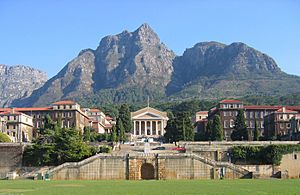
Beyond governments, many non-governmental organizations (NGOs) connect people across the Commonwealth. These groups focus on things like sports, culture, education, and law.
Commonwealth Foundation
The Commonwealth Foundation is an organization that helps strengthen civil society. This means it supports groups and people who work on important issues like democracy, human rights, and fighting poverty. It helps achieve the Commonwealth's goals.
Commonwealth Games

The Commonwealth Games are a huge multi-sport event held every four years. It's like a mini-Olympics just for Commonwealth countries. The Games include popular sports like athletics and swimming, but also sports especially loved in the Commonwealth, such as netball and rugby sevens.
The Games started in 1930 and are known as "the Friendly Games." They aim to build good relationships between Commonwealth countries and celebrate their shared sports and culture. The most recent Games were in Birmingham in 2022.
Commonwealth Youth Games
The Commonwealth Youth Games are for younger athletes, aged 14 to 18. The first Youth Games were held in Edinburgh, Scotland, in 2000. The most recent ones were in Trinidad and Tobago in 2023.
Commonwealth War Graves Commission
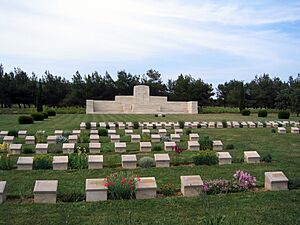
The Commonwealth War Graves Commission (CWGC) takes care of the graves of 1.7 million soldiers who died in the First and Second World Wars fighting for Commonwealth countries. It maintains thousands of war cemeteries worldwide. The CWGC treats all graves the same, no matter the soldier's rank, country, or religion.
Commonwealth of Learning
The Commonwealth of Learning (COL) helps countries share knowledge and resources for online learning and distance education. It helps developing nations get better access to quality education.
Commonwealth Local Government Forum
The Commonwealth Local Government Forum (CLGF) connects local governments and their associations across the Commonwealth. It helps promote democratic values and good local governance.
Commonwealth countries share many cultural links because of their history. These include the English language, similar sports, legal systems, and ways of governing.
Sports in the Commonwealth
Many Commonwealth nations enjoy similar sports that came from Britain. These include cricket, association football (soccer), rugby football, field hockey, and netball. These sports create friendly rivalries, especially between countries like the United Kingdom, Australia, New Zealand, and India.
For example, cricket has become very popular in Rwanda since it joined the Commonwealth, even though it was never a British colony. The Commonwealth Games are the biggest example of these shared sporting ties.
Literature from the Commonwealth
The shared history has also led to a lot of great writing in English from Commonwealth countries. This is known as Commonwealth literature. Many famous writers from places like India, Nigeria, South Africa, and the Caribbean have gained international recognition.
The Commonwealth Short Story Prize is awarded each year to encourage new writers.
Politics and Law
Most Commonwealth countries have similar legal and government systems. They often use a Westminster system of parliamentary democracy, where people elect their leaders. The Commonwealth Charter emphasizes commitment to democracy, human rights, and the rule of law.
Most Commonwealth countries use common law, which is based on English law. Judges are usually appointed by independent groups to ensure fairness.
Symbols of the Commonwealth
The Commonwealth has special symbols:
- The English language is a key symbol and a way for members to communicate.
- The Commonwealth Flag is dark blue with a gold globe surrounded by rays. It was adopted in 1976.
- Commonwealth Day is celebrated on the second Monday in March.
- "The Commonwealth Anthem" was created in 2009 for the Commonwealth's 60th anniversary. Its lyrics come from the Universal Declaration of Human Rights.
See also
 In Spanish: Mancomunidad de Naciones para niños
In Spanish: Mancomunidad de Naciones para niños
- Anglosphere
- English-speaking world
- Commonwealth Caribbean
- List of Commonwealth of Nations countries by GDP
- Community of Portuguese Language Countries, a group of Portuguese-speaking countries
- La Francophonie, a group of French-speaking countries
- Organization of Ibero-American States, a group of Spanish and Portuguese-speaking nations



